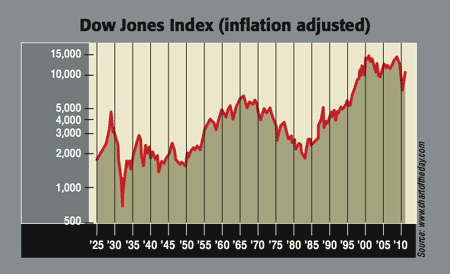Get the latest financial news, insights and expert analysis from our award-winning MoneyWeek team, to help you understand what really matters when it comes to your finances.
You are now subscribed
Your newsletter sign-up was successful
Want to add more newsletters?

Twice daily
MoneyWeek
Get the latest financial news, insights and expert analysis from our award-winning MoneyWeek team, to help you understand what really matters when it comes to your finances.

Four times a week
Look After My Bills
Sign up to our free money-saving newsletter, filled with the latest news and expert advice to help you find the best tips and deals for managing your bills. Start saving today!
The bounce in US housing is peaking. The median price of a new home has slid in three of the past four months. New home sales have dropped to a record low and mortgage applications for new purchases are at a 12-year low.
Given the government's efforts to prop up the market with tax credits for buyers and keep a lid on mortgage rates by buying mortgage-related securities, this is all "sobering", says John Authers in the FT.
That the market is weakening despite government support just shows that "the consumer is completely tapped out when it comes to big ticket items", says David Rosenberg of Gluskin Sheff. The end of the homebuyers' tax credit in June and next month's expiry of the Fed's mortgage-purchase programme clearly won't help.
MoneyWeek
Subscribe to MoneyWeek today and get your first six magazine issues absolutely FREE

Sign up to Money Morning
Don't miss the latest investment and personal finances news, market analysis, plus money-saving tips with our free twice-daily newsletter
Don't miss the latest investment and personal finances news, market analysis, plus money-saving tips with our free twice-daily newsletter
Meanwhile, with foreclosures at a record 15% of all home loans were either in foreclosure or late on a payment in December the supply surplus is set to rise even further. "The law of supply and demand" implies another 10%-15% dip in house prices, he says.
The big picture: sobering facts for stock bulls

This is a sobering reminder of how long stock investors can wait to make a real return. Only in the late 1950s did the Dow Jones Index regain its 1929 peak. The overall trend since the 1982-2000 bull market ended has been flat or down. Returns depend heavily on starting valuations.
Long-term bull runs begin when stocks are historically cheap. Unlike now, when the cyclically adjusted price/earnings ratio is above average and the market yields just 2%, half the long-term average. US investors "should remember that whenever they are tempted to get too bullish", says Buttonwood in The Economist.
Get the latest financial news, insights and expert analysis from our award-winning MoneyWeek team, to help you understand what really matters when it comes to your finances.
MoneyWeek is written by a team of experienced and award-winning journalists, plus expert columnists. As well as daily digital news and features, MoneyWeek also publishes a weekly magazine, covering investing and personal finance. From share tips, pensions, gold to practical investment tips - we provide a round-up to help you make money and keep it.
-
 Should you buy an active ETF?
Should you buy an active ETF?ETFs are often mischaracterised as passive products, but they can be a convenient way to add active management to your portfolio
-
 Power up your pension before 5 April – easy ways to save before the tax year end
Power up your pension before 5 April – easy ways to save before the tax year endWith the end of the tax year looming, pension savers currently have a window to review and maximise what’s going into their retirement funds – we look at how

